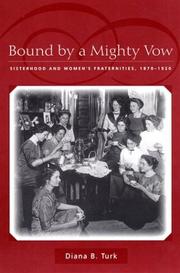| Listing 1 - 6 of 6 |
Sort by
|
Book
ISBN: 1469605961 0807888702 9780807888704 9781469605968 9780807832530 0807832537 9780807859315 0807859311 9798893132540 Year: 2009 Publisher: Chapel Hill : University of North Carolina Press,
Abstract | Keywords | Export | Availability | Bookmark
 Loading...
Loading...Choose an application
- Reference Manager
- EndNote
- RefWorks (Direct export to RefWorks)
Here is the first book to recount the full history of white college fraternities in America. Nicholas Syrett traces these organizations from their days in antebellum all-male schools to the sprawling modern-day college campus, paying special attention to how fraternity brothers have defined masculinity over the course of their 180-year history. Based on extensive research at twelve different schools and analyzing at least twenty national fraternities, The Company He Keeps explores the formation of what Syrett calls ""fraternal masculinity.""
Masculinity --- Male college students --- Greek letter societies --- Masculinity (Psychology) --- Sex (Psychology) --- Men --- Men college students --- College students --- College fraternities --- College sororities --- Fraternities --- Sororities, Greek letter --- Societies --- History. --- History

ISSN: 01698958 ISBN: 9789004150805 9004150803 9786611398972 1281398977 904740937X 9789047409373 9781281398970 9789047409373 661139897X Year: 2006 Volume: 277. Publisher: Leiden Brill
Abstract | Keywords | Export | Availability | Bookmark
 Loading...
Loading...Choose an application
- Reference Manager
- EndNote
- RefWorks (Direct export to RefWorks)
This volume maintains that contemporary events, ideologies, and institutions have shaped scholarly work on the ancient Roman collegia , a group of institutions known principally from epigraphic and legal sources. It traces the origins of thinking on the subject from the creation of the Corpus Inscriptionum Latinarum through the political and social movements of the 19th and 20th centuries in Western Europe. The bulk of the book focuses particularly on the intersection of scholarship and economic theory in Fascist Italy, as the collegia were analysed by the Istituto di Studi Romani, incorporated into the Mostra Augustea della Romanità , and ultimately championed by the Minister of National Education, Giuseppe Bottai, in 1939.
Fraternal organizations --- Societies --- Mutuelles --- Associations --- History. --- History --- Histoire --- Benefit societies --- Benevolent societies --- Fraternal benefit societies --- Friendly societies --- Mutual aid societies --- Mutual benefit associations --- Fraternal organizations - History. --- Greek letter societies --- College fraternities --- College sororities --- Fraternities --- Sororities, Greek letter
Periodical
ISSN: 23730331 23762659 Year: 1910 Publisher: Washington, D.C. Phi Beta Kappa Society
Abstract | Keywords | Export | Availability | Bookmark
 Loading...
Loading...Choose an application
- Reference Manager
- EndNote
- RefWorks (Direct export to RefWorks)
History --- Literature --- Greek letter societies --- Greek letter societies. --- Phi Beta Kappa --- Phi Beta Kappa. --- College fraternities --- College sororities --- Fraternities --- Sororities, Greek letter --- Societies --- Phi Beta Kappa Society --- United Chapters of Phi Beta Kappa

ISBN: 0814784143 0814784305 9780814784303 9780814782828 0814782825 0814782752 9780814782750 Year: 2004 Publisher: New York, NY
Abstract | Keywords | Export | Availability | Bookmark
 Loading...
Loading...Choose an application
- Reference Manager
- EndNote
- RefWorks (Direct export to RefWorks)
Sororities are often thought of as exclusive clubs for socially inclined college students, but Bound by a Mighty Vow , a history of the women's Greek system, demonstrates that these organizations have always served more serious purposes. Diana Turk explores the founding and development of the earliest sororities (then called women's fraternities) and explains how these groups served as support networks to help the first female collegians succeed in the hostile world of nineteenth century higher education. Turk goes on to look at how and in what ways sororities changed over time.
Greek letter societies --- College fraternities --- College sororities --- Fraternities --- Sororities, Greek letter --- Societies --- History. --- Kappa Alpha Theta --- Kappa Alpha Theta Fraternity --- Kappa Alpha Theta Fraternity for Women --- 378.4-055.2 --- 378.4 <73> --- 378.4 <73> Universiteiten--Verenigde Staten van Amerika. VSA. USA --- Universiteiten--Verenigde Staten van Amerika. VSA. USA --- History --- Universiteiten--Vrouwen
Book
ISBN: 9781438456744 1438456743 9781438456737 1438456735 9781438456720 1438456727 Year: 2015 Publisher: Albany
Abstract | Keywords | Export | Availability | Bookmark
 Loading...
Loading...Choose an application
- Reference Manager
- EndNote
- RefWorks (Direct export to RefWorks)
Are black men naturally violent? Do they define manhood in the same way as their counterparts across lines of race? Are black Greek-letter fraternities among the most dangerous student organizations on American college and university campuses? Can their often-dangerous initiation processes be stopped or even modified and, if not, what should be done about them? In this second edition of Black Haze, Ricky L. Jones takes on these questions and more. The first edition was an enlightening and sometimes disturbing examination of American men's quest for acceptance, comfort, reaffirmation, and manhood in a world where their footing is often unstable. In this new edition Jones not only provides masterful philosophical and ethical analyses but he also forces the engagement of a terrifying real world process that damages and kills students with all too frequent regularity. With a revealing new preface and stunning afterword, Jones immerses the reader in an intriguing and dark world marked by hypermasculinity, unapologetic brutality, and sometimes death. He offers a compelling book that ranges well beyond the subject of hazing—one that yields perplexing questions and demands difficult choices as we move forward in addressing issues surrounding fraternities, violent hazing, black men, and American society.
Greek letter societies --- African American college students --- Hazing --- Education --- Social Sciences --- Student Fraternities & Societies - U.S. --- Ragging --- Students --- Initiations (into trades, societies, etc.) --- College fraternities --- College sororities --- Fraternities --- Sororities, Greek letter --- Societies --- Afro-American college students --- College students, African American --- College students, Negro --- College students --- Conduct of life
Book
ISBN: 0820358142 0820358150 0820358169 9780820358147 9780820358154 9780820358161 Year: 2020 Publisher: Athens
Abstract | Keywords | Export | Availability | Bookmark
 Loading...
Loading...Choose an application
- Reference Manager
- EndNote
- RefWorks (Direct export to RefWorks)
"Women of Discriminating Taste examines the role of historically white sororities in the shaping of white womanhood in the twentieth century. As national women's organizations, sororities have long held power on college campuses and in American life. Yet the groups also have always been conservative in nature and inherently discriminatory, selecting new members on the basis of social class, religion, race, or physical attractiveness. In the early twentieth century, sororities filled a niche on campuses as they purported to prepare college women for "ladyhood." Sorority training led members to comport themselves as hyperfeminine, heterosocially inclined, traditionally minded women following a model largely premised on the mythical image of the southern lady. Although many sororities were founded at non-southern schools and also maintained membership strongholds in many non-southern states, the groups adhered to a decidedly southern aesthetic-a modernized version of Lost Cause ideology-in their social training to deploy a conservative agenda. Margaret L. Freeman researched sorority archives, sorority-related materials in student organizations, as well as dean of women's, student affairs, and president's office records collections for historical data that show how white southerners repeatedly called upon the image of the southern lady to support southern racial hierarchies. Her research also demonstrates how this image could be easily exported for similar uses in other areas of the United States that shared white southerners' concerns over changing social demographics and racial discord. By revealing national sororities as significant players in the grassroots conservative movement of the twentieth century, Freeman illuminates the history of contemporary sororities' difficult campus relationships and their continuing legacy of discriminatory behavior and conservative rhetoric"--
College sorority members --- Women, White --- Greek letter societies --- Conduct of life. --- History --- College fraternities --- College sororities --- Fraternities --- Sororities, Greek letter --- Societies --- White women --- College sorority sisters --- Members, College sorority --- Sisters, College sorority --- Sorority members, College --- Sorority sisters, College --- Women college students
| Listing 1 - 6 of 6 |
Sort by
|

 Search
Search Feedback
Feedback About UniCat
About UniCat  Help
Help News
News